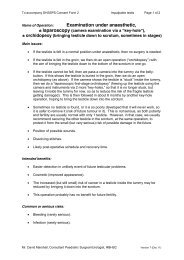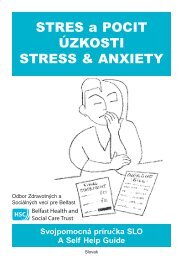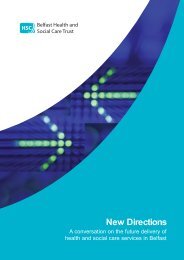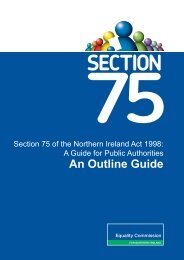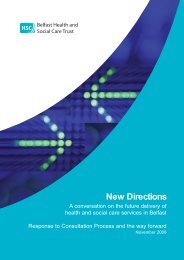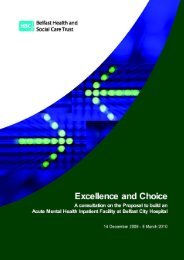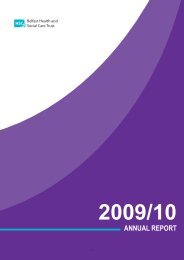Belfast Trust Guide to Paying Patients handbook - Belfast Health ...
Belfast Trust Guide to Paying Patients handbook - Belfast Health ...
Belfast Trust Guide to Paying Patients handbook - Belfast Health ...
Create successful ePaper yourself
Turn your PDF publications into a flip-book with our unique Google optimized e-Paper software.
ContentsIntroduction 3Objectives 4Categories of work covered by this Handbook 5Policy statement 6Consultant Medical staff responsibilities relating <strong>to</strong> private patients 7Restrictions on Private Practice applicable <strong>to</strong> medical staff 9Change of Status 10<strong>Trust</strong> staff responsibilities 11Operational arrangements 12Financial arrangements – private patients 15Financial arrangements – fee paying services and renunciation of private fees 16HSC patients who wish <strong>to</strong> pay for additional care 18Overseas <strong>Patients</strong> (Non UK) 20Glossary 221
AppendicesAppendix 1 Specific examples of fee paying services 23Schedule 10 – Consultant ContractAppendix 2 Code of Conduct for Private Practice 25Appendix 3 Undertaking <strong>to</strong> Pay Form 31Appendix 4 Change of Status Form 32Appendix 5 Principles governing the receipt of additional fees 33Schedule 11 – Consultant ContractAppendix 6 Notification of fee-paying services CAT 2 Form 34Appendix 7 Top up Determination of Cost Form 35Appendix 8 Top up of Additional Care Agreement Form 36Appendix 9 Amenity Request Form 37Appendix 10 Agreement for Voluntary Advance Renunciation of 38Earnings from Fee <strong>Paying</strong> ActivitiesAppendix 11 Provisions governing the relationship 39Between HPSS work and Private PracticeSchedule 9 – Consultant ContractAppendix 12 Private Practice Flowchart 42Appendix 13 Overseas Visi<strong>to</strong>rs Flowchart 432
IntroductionThe <strong>Trust</strong> came in<strong>to</strong> existence on 1 April 2007 and is responsible for providingintegrated care across six sites namely• the Royal Group of Hospitals and Social Services <strong>Trust</strong>• the Mater Hospital <strong>Health</strong> and Social Services <strong>Trust</strong>• <strong>Belfast</strong> City Hospital <strong>Health</strong> and Social Services <strong>Trust</strong>• Green Park <strong>Health</strong> and Social Services <strong>Trust</strong>• North and West <strong>Belfast</strong> <strong>Health</strong> and Social Services <strong>Trust</strong>• South and East <strong>Belfast</strong> <strong>Health</strong> and Social Services <strong>Trust</strong>The <strong>Trust</strong> welcomes additional income that can be generated from the followingsources• Private <strong>Patients</strong>• Fee <strong>Paying</strong> Services• HSC ‘<strong>to</strong>p up’ patients• Overseas Visi<strong>to</strong>rsAll income generated from these sources is deemed <strong>to</strong> make a valuedcontribution <strong>to</strong> the running costs of the <strong>Trust</strong> and will be reinvested <strong>to</strong> improveour facilities <strong>to</strong> benefit NHS and private patients alike.All Policies and procedures in relation <strong>to</strong> these areas will be carried out inaccordance with <strong>Trust</strong> guidelines.For further information please do not hesitate <strong>to</strong> contact the <strong>Paying</strong> PatientOffice.Eileen Murphyeileen.murphyppo@belfasttrust.hscni.net Senior Manager 028 9063 4390Jennifer Young BCH Site 028 9026 3656Martina Nugent-Corr Mater/Musgrave Site 028 9080 2392Lynda Weatherall RVH site 028 9063 5430Sarah Craig RVH site 028 9063 20863
ObjectivesThe purpose of this <strong>handbook</strong> is <strong>to</strong>:• Standardise the manner in which all paying patient practice is conducted inthe organisation.• Raise awareness of the duties and responsibilities within the health service ofconsultant medical staff engaging in private practice and fee paying serviceswithin the <strong>Trust</strong>.• Raise awareness of the duties and responsibilities of all <strong>Trust</strong> staff, clinical andnon clinical in relation <strong>to</strong> the treatment of paying patients and fee payingservices within the <strong>Trust</strong>.• Ensure fairness <strong>to</strong> both NHS patients and fee paying patients at all times.• Clarify for relevant staff the arrangements pertaining <strong>to</strong> paying patients and<strong>to</strong> give guidance relating <strong>to</strong>o record keepingo chargingo procedures ando responsibilities for paying patient attendances, admissions and fee payingservices.• Clarify charging arrangements when consultants undertake fee paying serviceswithin the <strong>Trust</strong>.4
Categories of work covered by this <strong>handbook</strong>Fee <strong>Paying</strong> ServicesAny paid professional services, other than those falling within the definition ofPrivate Professional Services, which a consultant carries out for a third party orfor the employing organisation and which are not part of, nor reasonablyincidental <strong>to</strong>, Contractual and Consequential Services. A third party for thesepurposes may be an organisation, corporation or individual, provided that theyare acting in a health related professional capacity, or a provider or commissionerof public services. Examples of work that fall within this category can be foundin Schedule 10 of the Terms and Conditions (Appendix 1).Private Professional Services (also referred <strong>to</strong> as ‘private practice’)• the diagnosis or treatment of patients by private arrangement (including suchdiagnosis or treatment under Article 31 of the <strong>Health</strong> and Personal SocialServices (Northern Ireland) Order 1972), excluding fee paying services asdescribed in Schedule 10 of the terms and conditions• work in the general medical, dental or ophthalmic services under Part IV ofthe <strong>Health</strong> and Personal Social Services (Northern Ireland) Order 1972 (exceptin respect of patients for whom a hospital medical officer is allowed a limited‘list’, e.g. members of the hospital staff).HSC <strong>Patients</strong> who Wish <strong>to</strong> Pay for Additional Private Care• From 2009 patients wishing <strong>to</strong> ‘<strong>to</strong>p up’ or supplement their NHS care havebeen able <strong>to</strong> do so without losing their entitlement <strong>to</strong> ongoing NHS care,an example of which is patients with cancer, who are now able <strong>to</strong> supplementtheir NHS care by paying for drugs which are not currently funded by theNHS.Overseas Visi<strong>to</strong>rsThe National <strong>Health</strong> Service provides healthcare free of charge <strong>to</strong> people whoare a permanent resident in the UK/NI. A person does not become an ordinarilyresident simply by having British Nationality; holding a British Passport; beingregistered with a GP, or having an NHS number. People who do not permanentlylive in NI/UK are not au<strong>to</strong>matically entitled <strong>to</strong> use the NHS free of charge.RESIDENCY is the therefore the main qualifying criterion.5
Policy StatementMedical and Dental consultant staff have the right <strong>to</strong> undertake Private Practiceand Fee paying services within the Terms and Conditions of the new ConsultantContract as agreed within their annual job plan review.This <strong>Trust</strong> provides the same care <strong>to</strong> all patients, regardless of whether the cos<strong>to</strong>f their treatment is paid for by HSC Organisations, Private Medical Insurancecompanies or by the patient.Private practice and Fee <strong>Paying</strong> services at the <strong>Trust</strong> will be carried out inaccordance with:• The Code of Conduct for private practice, the recommended standard ofpractice for NHS consultants as agreed between the BMA and the DHSSPS(Appendix 2).• Schedule 9 of the Terms and Conditions of the Consultant contract which setsout the provisions governing the relationship between HPSS work and privatepractice (Appendix 11).• The receipt of additional fees for Fee <strong>Paying</strong> services as defined in Schedule 10of the Terms and Conditions of the Consultant contract (Appendix 1).• The principles set out in Schedule 11 of the above contract (Appendix 5).All patients treated within the <strong>Trust</strong>, whether private or NHS should:• be allocated a unique hospital identifier• be recorded on the Patient Administration System and• have a <strong>Belfast</strong> <strong>Health</strong> & Social Care <strong>Trust</strong> chart.The <strong>Trust</strong> shall determine the prices <strong>to</strong> be charged in respect of all income <strong>to</strong>which it is entitled as a result of private practice or other fee paying serviceswhich take place within the <strong>Trust</strong>.6
Consultant Medical Staff ResponsibilitiesPrivate PracticeWhile Medical and Dental consultant staff have the right <strong>to</strong> undertake PrivatePractice within the Terms and Conditions of the new Consultant Contract asagreed within their annual job plan review, it is the responsibility of consultants,prior <strong>to</strong> the provision of any diagnostic tests or treatment <strong>to</strong>:• ensure that their private patients (whether In, Day or Out) are identified andnotified <strong>to</strong> the <strong>Paying</strong> <strong>Patients</strong> Officer• ensure full compliance with the Code of Conduct for Private Practice (seeAppendix 2) in relation <strong>to</strong> referral <strong>to</strong> NHS Waiting Lists• ensure that patients are aware of and understand ALL costs associated withprivate treatment including hospital costs and ALL professional fees which thepatient is likely <strong>to</strong> incur, <strong>to</strong> include Surgeon/Physician, Anaesthetist,Radiologist, Pathologist, hospital charges. Leaflets explaining charges areavailable and can be obtained from the <strong>Paying</strong> <strong>Patients</strong> Officer.• obtain prior <strong>to</strong> admission and at each outpatient attendance a signed,witnessed Undertaking <strong>to</strong> Pay form (Appendix 3) which must then be sent <strong>to</strong>the <strong>Paying</strong> Patient Officer for the relevant hospital. This document mustcontain details of all diagnostic tests and treatments prescribed.• Establish the method of payment at the consultation stage and obtain detailsof insured patients’ private medical insurance policy information. The <strong>Trust</strong>requires this information <strong>to</strong> be forwarded <strong>to</strong> the <strong>Paying</strong> Patient Officer prior <strong>to</strong>admission so that patients’ entitlement <strong>to</strong> insurance cover can be established.• Ensure that all patients are referred by the appropriate channels, ie. GP/otherconsultant.• Ensure that private patient services that involve the use of NHS staff or facilitiesare not undertaken except in emergencies, unless an undertaking <strong>to</strong> pay fortreatment has been obtained from (or on behalf of) the patient, in accordancewith the <strong>Trust</strong>’s procedures.Fee paying services - see Appendix 1 for examplesThe Consultant job plan review will cover the provision of fee paying serviceswithin the <strong>Trust</strong>. Consultants are required <strong>to</strong> liaise with the <strong>Paying</strong> <strong>Patients</strong> Officerregarding the type of work undertaken so that agreement can be reachedregarding the amount due <strong>to</strong> the <strong>Trust</strong> and how it should be remitted.A price list for fee paying services will be available from the <strong>Paying</strong> <strong>Patients</strong>Office.It is the responsibility of the Consultant <strong>to</strong> ensure that the <strong>Trust</strong> is reimbursed forall costs incurred while facilitating fee paying services work undertaken. Thesecosts could include• use of <strong>Trust</strong> accommodation• tests or other diagnostic procedures performed.• radiological scansConsultants who engage in fee paying activities within the <strong>Trust</strong> are required <strong>to</strong>remit <strong>to</strong> the <strong>Trust</strong> on a quarterly basis the income due.7
All patients seen for medical legal purposes must sign a notification of fee payingservices form and this should be retained and submitted by the consultant on aquarterly basis along with the corresponding payment. See relevant section forfurther details.Additional programmed activitiesConsultants should agree <strong>to</strong> accept an extra paid programmed activity in the<strong>Trust</strong>, if offered, before doing private work. The following points should beborne in mind:• If Consultants are already working 11 Programmed Activities (PAs) (orequivalent) there is no requirement <strong>to</strong> undertake any more work• A Consultant could decline an offer of an extra PA and still work privately, butwith risk <strong>to</strong> their pay progression for that or subsequent years• Any additional PAs offered must be offered equitably between all Consultantsin that specialty; if a colleague takes up those sessions there would be nodetriment <strong>to</strong> pay progression for the other Consultants.Consultant Medical Staff are governed by The Code of Conduct for PrivatePractice 2003 (at Appendix 2).8
Restrictions on Private Practice for ConsultantMedical StaffNew consultantsNewly appointed consultants (including those who have held consultant postselsewhere in the NHS, or equivalent posts outside the NHS) may not undertakeprivate practice within the <strong>Trust</strong> or use the <strong>Trust</strong>s facilities or equipment forprivate work, until the detailed arrangements for this have been agreed in writingwith their Clinical Direc<strong>to</strong>r and/or Direc<strong>to</strong>rate Direc<strong>to</strong>r and a job plan agreedwithin three months of commencement. New consultants permitted <strong>to</strong>undertake private work must make themselves known <strong>to</strong> the <strong>Paying</strong> <strong>Patients</strong>Officer.Locum consultantsLocum consultants may not engage in Private Practice within the first threemonths of appointment and then not until the detailed Job Plan has been agreedwith the relevant Clinical Direc<strong>to</strong>r and subject <strong>to</strong> the agreement of thepatient/insurer.HPSS Joint Appointment consultant staffAll joint appointees are contracted <strong>to</strong> the Queens University of <strong>Belfast</strong> and areaccountable <strong>to</strong> the <strong>Trust</strong> for the HPSS component of their post. Accordingly thesame regulations apply <strong>to</strong> them as <strong>to</strong> NHS consultants.Honorary Contract holdersConsultants holding honorary contracts are not permitted <strong>to</strong> undertake PrivatePractice or Fee <strong>Paying</strong> Services.Non Consultant Grade Medical StaffNon-consultant medical staff practitioners such as associate specialists who donot have their own beds may treat patients of a consultant on a private basis, bu<strong>to</strong>nlya) by special arrangement and with the agreement of:• consultant concerned• the practitioner’s supervising consultant and• the private patient/insurerb) when the practitioner undertakes such work outside the his/her programmedactivities as per their agreed job plan.Other than in the circumstances described above, staff are required <strong>to</strong> assist theconsultant <strong>to</strong> whom they are responsible with the treatment of their privatepatients in the same way as their NHS patients. The charge paid by privatepatients <strong>to</strong> the hospital covers the whole cost of the hospital treatment includingthat of all associated staff.9
Change of Status between Private and NHSTreatment EpisodeA patient who sees a consultant privately shall continue <strong>to</strong> have private statusthroughout the entire treatment episode.Single statusAn outpatient cannot be both a Private and an NHS patient for the treatment ofthe one condition during a single visit <strong>to</strong> an NHS hospital.Outpatient transferHowever a private outpatient at an NHS hospital is legally entitled <strong>to</strong> changehis/her status at a subsequent visit and seek treatment under the NHS, subject <strong>to</strong>the terms of any undertaking he has made <strong>to</strong> pay charges.Waiting listA patient seen privately in consulting rooms who then becomes an NHS patientjoins the waiting list at the same point as if his consultation had taken place as anNHS patient.Inpatient transferA private inpatient has a similar legal entitlement <strong>to</strong> change his status. Thisentitlement can only be exercised when a significant and unforeseen change incircumstances arises e.g. when they enter hospital for a minor operation and theyare found <strong>to</strong> be suffering from a different more serious complaint. He remainsliable <strong>to</strong> charges for the period during which he was a private patient.Clinical priorityA change of status from Private <strong>to</strong> NHS must be accompanied by an assessmen<strong>to</strong>f the patient’s clinical priority for treatment as an NHS patient.Change of status formWhere a change of status is required a ‘Change of Status’ Form (Appendix 4)must be completed and sent <strong>to</strong> the <strong>Paying</strong> <strong>Patients</strong> Officer. This includes thereason for the change of status which will be subject <strong>to</strong> audit and must be signedby both the consultant and <strong>Paying</strong> <strong>Patients</strong> Officer.It is important <strong>to</strong> note that until the Change of Status form has beenreceived by the <strong>Paying</strong> Patient Office the patients status will remainprivate and they may well be liable for charges.10
<strong>Trust</strong> Staff Responsibilities relating <strong>to</strong> Private <strong>Patients</strong>and Fee <strong>Paying</strong> ServicesA private patient is one who formally undertakes <strong>to</strong> pay charges for healthcareservices regardless of whether they self pay or are covered by insurance and allprivate patients must sign a form <strong>to</strong> that effect (The Undertaking <strong>to</strong> Pay form atAppendix 3) prior <strong>to</strong> the provision of any diagnostic tests or treatments. <strong>Trust</strong>staff are required <strong>to</strong> have an awareness of this obligation.The charge which private patients pay <strong>to</strong> the <strong>Trust</strong> covers the <strong>to</strong>tal cost of thehospital treatment excluding consultant fees. <strong>Trust</strong> staff are required <strong>to</strong> performtheir duties in relation <strong>to</strong> all patients <strong>to</strong> the same standard. No payment* shouldbe made <strong>to</strong> or accepted by any non consultant member of <strong>Trust</strong> staff for carryingout normal duties in relation <strong>to</strong> any patients of the <strong>Trust</strong>.* This excludes payments owed <strong>to</strong> professional staff under their terms andconditions or the regulations of their professional bodies. This could include forexample payments made by the Board <strong>to</strong> junior doc<strong>to</strong>rs and non consultantgrade medical staff who undertake family planning service work.11
Operational ArrangementsEach hospital within the <strong>Trust</strong> has a named officer who should be notified inadvance of all private patient admissions, day cases and outpatients. The <strong>Paying</strong>Patient Officer is responsible for ensuring that the <strong>Trust</strong> recovers all income due<strong>to</strong> the <strong>Trust</strong> arising from the treatment of private patients.The <strong>Paying</strong> <strong>Patients</strong> Officer, having received the signed and witnessedUndertaking <strong>to</strong> Pay form will identify the costs associated with the private patientstay, will confirm entitlement <strong>to</strong> insurance cover where relevant and will raiseinvoices on a timely basis.All Direc<strong>to</strong>rates should advise the <strong>Paying</strong> <strong>Patients</strong> Officer as soon as any newconsultant agrees a job plan which includes private practice. The <strong>Paying</strong> <strong>Patients</strong>Officer will advise them of the procedures involved in undertaking privatepractice in the <strong>Trust</strong>.Clinical governance is defined as a framework through which NHS organisationsare accountable for continuously improving the quality of their services andsafeguarding high standards of care by creating an environment in whichexcellence in clinical care will flourish.This framework applies <strong>to</strong> all patients seen within this <strong>Trust</strong>. It is therefore afundamental requirement of Clinical Governance that all patients treated withinthe <strong>Trust</strong> must be examined or treated in an appropriate clinical setting .Any fee or emolument etc which may be received by an employee in the courseof his or her clinical duties shall, unless the <strong>Trust</strong> otherwise directs be surrendered<strong>to</strong> the <strong>Trust</strong>.Record keeping systems and Private <strong>Patients</strong>All patients regardless of their status, NHS or Private, Medical Legal, OSV/NUKshould be recorded on Hospital Systems and their status classified appropriately.These systems include for example:• Patient Administration System (PAS)• Northern Ireland Maternity System (NIMATS)• Labora<strong>to</strong>ry System (e.g.Lab Centre etc)• Radiology System(e.g. Sectra, NIRADS, RIS etc)The rule applies equally <strong>to</strong>:• private patients, medical legal patients, ‘<strong>to</strong>p up’ patients and Overseas Visi<strong>to</strong>rs• in, day and out patients,• each of the hospitals within the <strong>Trust</strong>.12
<strong>Health</strong> Records of Private <strong>Patients</strong>All health records shall remain the property of the <strong>Trust</strong> and should only be takenoutside the <strong>Trust</strong> <strong>to</strong> assist treatment elsewhere:• when this is essential for the safe treatment of the patient• when an electronic record of the destination of the notes is made using thecase note tracking system• when arrangements can be guaranteed that such notes will be kept securely(not for example in a consultant’s car or brief case or during transportation)• provided that nothing is removed from the notesConsultants who borrow notes for private treatment of patients must agree <strong>to</strong>return the notes without delay.Since the <strong>Trust</strong> does not have a right of access <strong>to</strong> patient notes held in non NHSfacilities, when patients are seen privately outside the <strong>Trust</strong> their firstappointment within the <strong>Trust</strong>, unless with the same consultant, will be treated asa ‘new appointment’ rather than a ‘review appointment’.Booking arrangements for Admissions and AppointmentsA record of attendance should be maintained for all patients seen in the <strong>Trust</strong>. Allprivate in, day and out patients should as far as possible be pre-booked on <strong>to</strong> thehospital information systems. Direc<strong>to</strong>rates are responsible for ensuring that allrelevant information is captured and ‘booking in’ procedures are followed. Eachdepartment should ensure that all such patients are recorded on PAS etc withinan agreed timescale which should not extend beyond month end.Walk InsA private patient who appears at a clinic and has no record on PAS should betreated for record keeping purposes in exactly the same manner as an NHSpatient (walk in) i.e. relevant details should be taken, registry contacted for anumber and processed in the usual fashion. A record should be kept of thispatient and the <strong>Paying</strong> Patient Officer informed.RadiologyAll patients seen in Radiology should be given a <strong>Belfast</strong> <strong>Health</strong> and Social Carehospital number.Private Patient RecordsAll records associated with the treatment of private patients should bemaintained in the same way as for NHS patients. This includes all files, charts,and correspondence with General practitioners.Accurate record keeping assists in the collection of income from paying patients.13
It should be noted that• any work associated with private patients who are not treated within this <strong>Trust</strong>or consultants private diary work and correspondence associated with patientsseen elsewhere should not be carried out within staff time which is paid for bythe <strong>Trust</strong>.Tests Investigations or Prescriptions for Private <strong>Patients</strong>The consultant must ensure that the requests for all labora<strong>to</strong>ry work, ie.radiology, prescriptions, dietetics, physiotherapy etc are clearly marked as Private.Consultants should not arrange services, tests investigations or prescriptions untilthe person has signed an undertaking <strong>to</strong> pay form.Medical ReportsIn certain circumstances Insurance Companies will request a medical report fromthe consultant. It is the consultant’s responsibility <strong>to</strong> ensure that this report iscompleted in the timeframe required by the insurance company otherwise the<strong>Trust</strong>’s invoice may remain unpaid in whole or in part until the report has beenreceived and assessed.14
Financial Arrangements - Private <strong>Patients</strong>Charges <strong>to</strong> patientsWhere patients who are private <strong>to</strong> a consultant are admitted <strong>to</strong> the hospital, orare seen as outpatients, charges will be levied by the hospital. A full list ofcharges is available from the <strong>Paying</strong> Patient Office on request.Prices are reviewed regularly <strong>to</strong> ensure that all costs are covered.Basis of pricingCharges are based on an accommodation charge, cost of procedure, includingany prosthesis, and on a cost per item basis for all diagnostic tests andtreatments e.g. physiotherapy, labora<strong>to</strong>ry and radiology tests, ECGs etc. They donot include consultants’ professional fees. Some package prices may be agreed.Uninsured patients - DepositsA deposit, payable on admission, is required from uninsured patients undergoinghigh cost procedures. Consultants should advise patients that this is the case.The patient should be advised <strong>to</strong> contact the <strong>Paying</strong> <strong>Patients</strong> Officer regardingamounts etc.Insured <strong>Patients</strong>The Undertaking <strong>to</strong> Pay Form also requires details of the patient’s insurancepolicy. The <strong>Paying</strong> <strong>Patients</strong> Officer will raise invoices direct <strong>to</strong> the insurancecompany where relevant, in accordance with the agreements with individualinsurance companies.Consultants, as the first port of contact and the person in control of thetreatment provided, should ensure that the patient has obtained their insurancecompany’s permission for the specified treatment <strong>to</strong> take place within thespecified timescale.Billing and PaymentThe <strong>Paying</strong> <strong>Patients</strong> Officer co-ordinates the collation of financial informationrelating <strong>to</strong> patients’ treatment, ensures that uninsured patients pay deposits andthat invoices are raised accordingly. The financial accounts department willensure all invoices raised are paid and will advise the Private Patient Officer in theevent of a bad debt.AuditThe <strong>Trust</strong>’s financial accounts are subject <strong>to</strong> annual audit and an annual report isissued <strong>to</strong> the <strong>Trust</strong> Board, which highlights any area of weakness in control.Adherence <strong>to</strong> the <strong>Paying</strong> Patient Policy will form part of the <strong>Trust</strong>’s Audit Plan.Consultants are reminded that they are responsible for the identification andrecording of paying patient information. Failure <strong>to</strong> follow the procedures willresult in investigation by Audit and if necessary, disciplinary action under <strong>Trust</strong>and General Medical Council regulations.15
Financial Arrangements for fee paying servicesConsultants may see patients privately or for fee paying services within the <strong>Trust</strong>only with the explicit agreement of the Management, in accordance with theirJob Plan. Management will decide <strong>to</strong> what extent, if any, <strong>Trust</strong> facilities, staff andequipment may be used for private patient or fee paying services and will ensurethat any such services do not interfere with the organisation’s obligations <strong>to</strong> NHSpatients. This applies whether private services are undertaken in the consultant’sown time, in annual or unpaid leave.In line with the Code of conduct standards, private patient services should takeplace at times that do not impact on normal services for NHS patients. Privatepatients should normally be seen separately from scheduled NHS patients.Fee <strong>Paying</strong> Services Policy (Category 2)Fee <strong>Paying</strong> Services (Category 2) work is distinct from private practice, however itis still non NHS work as outlined in the ‘Terms and Conditions for HospitalMedical and Dental Staff’. Refer <strong>to</strong> schedules 10 and 11 (Appendices 1 & 5respectively) for further details.There are a number of occasions when a Category 2 report will be requested,and they will usually be commissioned by, employers, courts, solici<strong>to</strong>rs,Department of Work and Pensions etc, the report may include radiologicalopinion, blood tests or other diagnostic proceduresIt is the responsibility of the Consultant <strong>to</strong> ensure that the <strong>Trust</strong> is reimbursed forall costs incurred in undertaking Category 2 work, this not only includes the useof the room but also the cost of any tests undertaken.The charge for each attendance is intended <strong>to</strong> reimburse the full cost <strong>to</strong> the <strong>Trust</strong>of providing facilities for consulting purposes. Where a patient attends hospitalfor a specific treatment or test only the cost of that treatment/test is chargeable.In order <strong>to</strong> comply with the <strong>Trust</strong>s financial governance controls it is essential thatall Fee <strong>Paying</strong> services are identified and the costs recovered. It is not theresponsibility of the <strong>Trust</strong> <strong>to</strong> invoice third parties for Category 2 work, it is theresponsibility of the Consultant <strong>to</strong> recover the cost from the third party andreimburse the <strong>Trust</strong>, on a quarterly basis, for any Category 2 services they haveundertaken, including the cost of any treatments/tests provided.The Category 2 (room only) charge per patient will be reviewed annually.(*) A per session rate may be available subject <strong>to</strong> agreement with the <strong>Paying</strong> PatientManagerIt is an audit requirement that the <strong>Trust</strong> verifies that all income associated withFee <strong>Paying</strong> services has been identified and collected. Accordingly, Consultantsare required <strong>to</strong> submit a quarterly return <strong>to</strong> the <strong>Paying</strong> Patient office with thenames of the patients seen (including Category 2 work), <strong>to</strong>gether with details ofany treatment or tests undertaken. This information should accompany thepayment for the relevant fees of Category 2 work as outlined above.In order <strong>to</strong> comply with Data Protection requirements, Consultants musttherefore inform their Category 2 clients that this information is required by the<strong>Trust</strong> and obtain their consent by completing a notification of Fee <strong>Paying</strong> Servicesform (Appendix 6).16
Category 2 activity should be recorded on the Patient Administration System(PAS) as ward attendees using the ward code MLW and category PPG.Compliance <strong>to</strong> this policy will be moni<strong>to</strong>red by the <strong>Paying</strong> Patient Manager andthe Medical Direc<strong>to</strong>r’s Office.The Consultant is responsible <strong>to</strong> HM Cus<strong>to</strong>ms and Revenue <strong>to</strong> declare for taxpurposes all Category 2 income earned. The <strong>Trust</strong> has no obligation in thisrespect.Any Category 2 work undertaken for consultants by medical secretaries must becompleted outside of their normal NHS hours. Consultants should be aware oftheir duty <strong>to</strong> inform their secretaries that receipt of such income is subject <strong>to</strong>taxation and must be declared <strong>to</strong> the Inland Revenue. It is recommended thatConsultants keep accurate records of income and payment.Renunciation of private feesIn some departments, consultants may choose <strong>to</strong> forego their private fees forprivate practice or for fee paying services in favour of a Charitable Fund managedby the <strong>Trust</strong>.For income tax purposes all income earned must be treated as taxable earnings.The only way in which this income can be treated as non taxable earnings of theconsultant concerned is if the consultant signs a ‘Voluntary AdvanceRenunciation of Earnings form’ (Appendix 10) and declares that the earningsfrom a particular activity will belong <strong>to</strong> a named charitable fund and that theearnings will not be received by the consultant. In addition a consultant shouldnever accept a cheque made out <strong>to</strong> him or her personally. To do so attractstaxation on that income and it cannot be subsequently renounced. Therefore allsuch income renounced in advance should be paid directly in<strong>to</strong> the relevant fund.Income can only be renounced if it has not been paid <strong>to</strong> the individual. Therenunciation form can be obtained from the Finance Department and a Registerof these will be maintained by the Charitable Funds Officer.The <strong>Trust</strong> will be required <strong>to</strong> demonstrate that income renounced in favour of aCharitable Fund is not retained for the use of the individual who renounces it.Thus, in the event of any such consultant subsequently drawing on that fund,any such expenditure approval must be countersigned by another signa<strong>to</strong>ry onthe fund.17
HSC <strong>Patients</strong> who wish <strong>to</strong> pay for additional private carePLEASE NOTE THIS IS ONLY A BRIEF GUIDE THE FULL POLICY CAN BEOBTAINED FROM THE PAYING PATIENT OFFICE ON REQUESTGuiding PrinciplesAll actions must be carried out within the principles as outlined below:Entitlement <strong>to</strong> HSC Care must RemainA patient’s entitlement <strong>to</strong> HSC care should not be withdrawn as a result ofpurchasing additional drug treatments privately.Clarity of Distinction between HSC and Private CareIt should always be clear whether an individual procedure or treatment isprivately funded or HSC funded. HSC resources must never be used <strong>to</strong> subsidisethe use of private care.Separation of Provision between HSC and Private CarePrivate care should be carried out at a different time and in a different place <strong>to</strong>the HSC care, ie as separate from those receiving HSC care as possible. Adifferent place could include the facilities of a healthcare provider, or part of anHSC organisation which has been permanently or temporarily designated forprivate care, or the services of home healthcare provider. Departing from thisprinciple should only be considered where there are overriding concerns ofpatient safety rather than mere issues of convenience.It would be good practice that the Consultant delivering the private aspect of thecare is a different Consultant <strong>to</strong> that delivering the publicly funded component ofthe care. This may not be feasible in every circumstance.HSC Funding Options must first be ExhaustedDoc<strong>to</strong>rs, working with managers, should exhaust all reasonable avenues forsecuring HSC funding before suggesting a patient’s only option is <strong>to</strong> pay for careprivately.Governance / Risk ManagementTransferring between private and HSC care should be carried out in a way whichavoids putting patients at unnecessary risk.It is the consultants responsibility <strong>to</strong> follow the process below and inform the<strong>Paying</strong> Patient Office of any patient who is considering this option so that thepatient is made fully aware of all costs involved prior <strong>to</strong> any treatmentcommencing.ProcessStep 1A patient indicates their desire <strong>to</strong> pay for additional private care <strong>to</strong> theirConsultant.18
Step 2The Consultant completes a ‘Determination of Cost’ form (Appendix 7) with thefollowing information:- Patient Details- Additional Chemotherapy Treatment, Frequency, Care Setting- Pharmacy Costs- Diagnostic Tests- Toxicity Grading reflecting Increased Risk of AdmissionStep 3The Consultant emails the Determination of Cost form <strong>to</strong> the Private PatientOfficer who generates an estimated cost for the patient / Consultant as required.Step 4If the patient agrees <strong>to</strong> go ahead with the additional private care, the patient andConsultant both sign the Additional Private Care Agreement form (Appendix 8).This is then sent <strong>to</strong> the <strong>Paying</strong> <strong>Patients</strong> Office as it acts as an Undertaking <strong>to</strong> Payform. The <strong>Paying</strong> <strong>Patients</strong> Office will retain a copy, give a copy <strong>to</strong> the patient, <strong>to</strong>pharmacy and <strong>to</strong> the Consultant for filing in the patient’s notes.Billing and Recouping CostsThe patient will pay per cycle of chemotherapy, with each payment beingreceived in advance of the treatment being administered. Where treatment hasbeen authorised and preparation of a drug has been commenced for a patientwho becomes <strong>to</strong>o unwell <strong>to</strong> proceed, the cost of the drug will be charged <strong>to</strong> thepatient for whom it was originally prepared, and where payment has alreadybeen received, the cost will not be refundedIf a decision is taken during or after treatment that the drug in question is <strong>to</strong> beprovided on the HSC, costs will not be refunded.Where treatment has been authorised and a drug preparation commenced whichdoes not result in administration for non patient reasons, the costs of repeat drugpreparation, where required, will be covered by the <strong>Trust</strong>.The process of billing and recouping payments will be managed via the <strong>Trust</strong>’s<strong>Paying</strong> <strong>Patients</strong> Office.19
Overseas visi<strong>to</strong>rs - Non UK patients(Republic of Ireland, EEA, Foreign Nationals)PLEASE NOTE THIS IS ONLY A BRIEF GUIDE FOR FURTHER INFORMATIONPLEASE CONTACT THE PAYING PATIENT OFFICEThe NHS provides healthcare free of charge <strong>to</strong> people who are ordinarily residentin the UK. People who do not permanently live in the UK lawfully are notau<strong>to</strong>matically entitled <strong>to</strong> use the NHS free of charge.RESIDENCY is the therefore the main qualifying criterion, applicable regardless ofnationality, being registered with a GP or having been issued a HC/NHS number,or whether the person holds a British Passport, or lived and paid taxes or nationalinsurance contributions in the UK in the past.Any patient attending the <strong>Trust</strong> who cannot establish that they are an ordinaryresident and have lawfully lived in the UK permanently for the last 12 monthspreceeding treatment are not entitled <strong>to</strong> free non ED hospital treatment whetherthey are registered with a GP or not. A GP referral letter cannot be acceptedsolely as proof of a patient’s permanent residency and therefore entitlement <strong>to</strong>treatment.For all new patients attending the <strong>Trust</strong>, residency must be established. Allpatients will be asked <strong>to</strong> complete a declaration <strong>to</strong> confirm residency, (regardlessof race/ethnic origin. If not the <strong>Trust</strong> could be accused of discrimination.Where there is an element of doubt as <strong>to</strong> whether the patient is an ‘ordinaryresident’ eg no GP/ H&C number or non UK contact details, the <strong>Paying</strong> <strong>Patients</strong>Officer must be alerted immediately.Emergency DepartmentTreatment given in an Emergency Department, Walk in clinic or minor casualtyunit is free of charge if it is deemed <strong>to</strong> be immediate and necessary.The <strong>Trust</strong> should always provide immediate and necessary treatment whether ornot the patient has been informed of or agreed <strong>to</strong> pay charges .There is noexemption from charges for ‘emergency’ treatment other than that given in theaccident and emergency department. Once an overseas patient is transferred ou<strong>to</strong>f Emergency Department their treatment becomes chargeable.All patients admitted from Emergency Department must be asked <strong>to</strong> completedeclaration of residency status.This question is essential in trying <strong>to</strong> establish whether the patient is an overseaspatient or not and hence liable <strong>to</strong> pay for any subsequent care provided.If the patient is not an ordinary resident or there is an element of doubt eg noGP/ no H&C, the patient should be referred <strong>to</strong> <strong>Paying</strong> <strong>Patients</strong> Office <strong>to</strong>determine their eligibility.If the person has indicated that they are a visi<strong>to</strong>r <strong>to</strong> Northern Ireland, theoverseas address must be entered as the permanent address on the correctPatient Administrative System and the <strong>Paying</strong> <strong>Patients</strong> Office should be notifiedimmediately.20
Outpatient AppointmentsIn all cases where the patient has not lived in Northern Ireland for 12 months orrelevant patient data is missing such as H&C number, GP Details etc the patientmust be referred <strong>to</strong> the paying patient office <strong>to</strong> establish the patient’s entitlement<strong>to</strong> free NHS treatment. This must be established before an appointment is given.Review AppointmentsWhere possible follow up treatment should be carried out at the patient’s localhospital, however if they are reviewed at the <strong>Trust</strong> they must be informed thatthey will be liable for charges.If a consultant considers it appropriate <strong>to</strong> review a patient then they must sign astatement <strong>to</strong> this effect waiving the charges that would have been due <strong>to</strong> the<strong>Trust</strong>.Elective AdmissionA patient should not be placed on<strong>to</strong> a waiting list until their entitlement <strong>to</strong> freeNHS Treatment has been established. Where the Patient is chargeable, the <strong>Trust</strong>should not initiate a treatment process until a deposit equivalent <strong>to</strong> the estimatedfull cost of treatment has been obtained.Referral from other NHS <strong>Trust</strong>sWhen a Consultant accepts a referral from another <strong>Trust</strong> the patients’ statusshould where possible be established prior <strong>to</strong> admission. However, absence ofthis information should not delay urgent treatment.The <strong>Trust</strong> will operate a policy of ‘Stabilise and Transfer’.Amenity bed <strong>Patients</strong>Within The <strong>Trust</strong>’s Maternity Service, a number of beds are assigned AmenityBeds. It is permissible for NHS patients who require surgical delivery and anovernight stay <strong>to</strong> pay for any bed assigned as an Amenity Bed. This payment hasno effect on the NHS status of the patient. All patients identified as amenity willbe recorded on PAS as APG and an amenity form (Appendix 9) should becompleted ideally before obtaining the amenity facilities.21
GlossaryUndertaking <strong>to</strong> Pay FormPrivate <strong>Patients</strong> may fund their treatment, or they may have private medicalinsurance. In all cases Private <strong>Patients</strong> must sign an ‘Undertaking <strong>to</strong> Pay’ form(Appendix 3).This is a legally binding document which, when signed prior <strong>to</strong> treatment,confirms the patient as personally liable for costs incurred while at hospital andconfirms the <strong>Patients</strong> Private status.ALL private patients, whether insured or not are obliged <strong>to</strong> complete and sign an‘Undertaking <strong>to</strong> Pay’ form, prior <strong>to</strong> commencement of treatment. Consultantstherefore, as the first point of contact should ensure that the <strong>Paying</strong> <strong>Patients</strong>Officer is advised <strong>to</strong> ensure completion of the ‘Undertaking <strong>to</strong> Pay’ form.Fee <strong>Paying</strong> ServicesAny paid professional services, other than those falling within the definition ofPrivate Professional Services, which a consultant carries out for a third party or forthe employing organisation and which are not part of, nor reasonably incidental<strong>to</strong>, Contractual and Consequential Services. A third party for these purposes maybe an organisation, corporation or individual, provided that they are acting in ahealth related professional capacity, or a provider or commissioner of publicservices. Examples of work that fall within this category can be found inSchedule 10 of the Terms and Conditions (Appendix 1).Private Professional Services (Also referred <strong>to</strong> as ‘private practice’)• the diagnosis or treatment of patients by private arrangement (including suchdiagnosis or treatment under Article 31 of the <strong>Health</strong> and Personal SocialServices (Northern Ireland) Order 1972), excluding fee paying services asdescribed in Schedule 10 of the terms and conditions (Appendix 1).• work in the general medical, dental or ophthalmic services under Part IV of the<strong>Health</strong> and Personal Social Services (Northern Ireland) Order 1972 (except inrespect of patients for whom a hospital medical officer is allowed a limited‘list’, e.g. members of the hospital staff).Non UK patientsA person who does not meet the ‘ordinarily resident’ testJob PlanA work programme which shows the time and place of the consultant's weeklyfixed commitments.22
Appendix 1Specific examples of Fee <strong>Paying</strong> Services - Schedule 101. Fee <strong>Paying</strong> Services are services that are not part of Contractual orConsequential Services and not reasonably incidental <strong>to</strong> them. Fee <strong>Paying</strong>Services include:a. work on a person referred by a Medical Adviser of the Department ofSocial Development, or by an Adjudicating Medical Authority or aMedical Appeal Tribunal, in connection with any benefits administeredby an Agency of the Department of Social Development;b. work for the Criminal Injuries Compensation Board, when a specialexamination is required or an appreciable amount of work is involved inmaking extracts from case notes;c. work required by a patient or interested third party <strong>to</strong> serve the interestsof the person, his or her employer or other third party, in such nonclinicalcontexts as insurance, pension arrangements, foreign travel,emigration, or sport and recreation. (This includes the issue ofcertificates confirming that inoculations necessary for foreign travel havebeen carried out, but excludes the inoculations themselves. It alsoexcludes examinations in respect of the diagnosis and treatment ofinjuries or accidents);d. work required for life insurance purposes;e. work on prospective emigrants including X-ray examinations and bloodtests;f. work on persons in connection with legal actions other than reportswhich are incidental <strong>to</strong> the consultant’s Contractual and ConsequentialDuties, or where the consultant is giving evidence on the consultant’sown behalf or on the employing organisation’s behalf in connection witha case in which the consultant is professionally concerned;g. work for coroners, as well as attendance at coroners' courts as medicalwitnesses;h. work requested by the courts on the medical condition of an offender ordefendant and attendance at court hearings as medical witnesses,otherwise than in the circumstances referred <strong>to</strong> above;i. work on a person referred by a medical examiner of HM Armed ForcesRecruiting Organisation;j. work in connection with the routine screening of workers <strong>to</strong> protectthem or the public from specific health risks, whether such screening is astatu<strong>to</strong>ry obligation laid on the employing organisation by specificregulation or a voluntary undertaking by the employing organisation inpursuance of its general liability <strong>to</strong> protect the health of its workforce;k. occupational health services provided under contract <strong>to</strong> other HPSS,independent or public sec<strong>to</strong>r employers;l. work on a person referred by a medical referee appointed under theWorkmen's Compensation (Supplementation) Act (Northern Ireland)1966; work on prospective students of universities or other institutionsof further education, provided that they are not covered by Contractual23
Appendix 1and Consequential Services. Such examinations may include chestradiographs;m. Appropriate examinations and recommendations under Parts II and IV ofthe Mental <strong>Health</strong> (Northern Ireland) Order 1986 and fees payable <strong>to</strong>medical members of Mental <strong>Health</strong> Review Tribunals;n. services performed by members of hospital medical staffs forgovernment departments as members of medical boards;o. work undertaken on behalf of the Employment Medical Advisory Servicein connection with research/survey work, i.e. the medical examination ofemployees intended primarily <strong>to</strong> increase the understanding of thecause, other than <strong>to</strong> protect the health of people immediately at risk(except where such work falls within Contractual and ConsequentialServices);p. completion of Form B (Certificate of Medical Attendant) and Form C(Confirma<strong>to</strong>ry Medical Certificate) of the cremation certificates;q. examinations and reports including visits <strong>to</strong> prison required by the PrisonService which do not fall within the consultant’s Contractual andConsequential Services and which are not covered by separatecontractual arrangements with the Prison Service;r. examination of blind or partially-sighted persons for the completion ofform A655, except where the information is required for social securitypurposes, or by an Agency of the Department of Social Development, orthe Employment Service, or the patient's employer, unless a specialexamination is required, or the information is not readily available fromknowledge of the case, or an appreciable amount of work is required <strong>to</strong>extract medically correct information from case notes;s. work as a medical referee (or deputy) <strong>to</strong> a cremation authority andsigning confirma<strong>to</strong>ry cremation certificates;t. medical examination in relation <strong>to</strong> staff health schemes of localauthorities and fire and police authorities;u. delivering lectures;v. medical advice in a specialised field of communicable disease control;w. attendance as a witness in court;x. medical examinations and reports for commercial purposes, e.g.certificates of hygiene on goods <strong>to</strong> be exported or reports for insurancecompanies;y. advice <strong>to</strong> organisations on matters on which the consultant isacknowledged <strong>to</strong> be an expert.24
Appendix 2A Code of Conduct for Private PracticeNovember 2003Recommended Standards of Practicefor NHS ConsultantsAn agreement between the BMA’s Northern Ireland Consultants andSpecialists Committee and the Department of <strong>Health</strong>, Social Servicesand Public Safety for consultants in Northern Ireland.A CODE OF CONDUCT FOR PRIVATE PRACTICE:RECOMMENDED STANDARDS FOR NHS CONSULTANTS, 2003ContentsPage 40Part I – Introduction- Scope of Code- Key PrinciplesPage 41Part II - Standards of Best Practice- Disclosure of Information about Private Practice- Scheduling of Work and On-Call Duties- Provision of Private Services alongside NHS Duties- Information for NHS <strong>Patients</strong> about PrivateTreatment- Referral of Private <strong>Patients</strong> <strong>to</strong> NHS Lists- Promoting Improved Patient Access <strong>to</strong> NHS Careand increasing NHS CapacityPage 6Part III - Managing Private <strong>Patients</strong> in NHSFacilities- Use of NHS Facilities- Use of NHS Staff25
Appendix 2Part I: IntroductionScope of Code1.1 This document sets out recommended standards of best practice for NHSconsultants in England about their conduct in relation <strong>to</strong> private practice .The standards are designed <strong>to</strong> apply equally <strong>to</strong> honorary contract holders inrespect of their work for the NHS. The Code covers all private work,whether undertaken in non-NHS or NHS facilities.1.2 Adherence <strong>to</strong> the standards in the Code will form part of the eligibilitycriteria for clinical excellence awards.1.3 This Code should be used at the annual job plan review as the basis forreviewing the relationship between NHS duties and any private practice.Key Principles1.4 The Code is based on the following key principles:NHS consultants and NHS employing organisations should work on apartnership basis <strong>to</strong> prevent any conflict of interest between privatepractice and NHS work. It is also important that NHS consultants and NHSorganisations minimise the risk of any perceived conflicts of interest;although no consultant should suffer any penalty (under the code) simplybecause of a perception;The provision of services for private patients should not prejudice theinterest of NHS patients or disrupt NHS services;With the exception of the need <strong>to</strong> provide emergency care, agreed NHScommitments should take precedence over private work; andNHS facilities, staff and services may only be used for private practice withthe prior agreement of the NHS employer.26
Appendix 2Part II: Standards of Best PracticeDisclosure of Information about Private Practice2.1 Consultants should declare any private practice, which may give rise <strong>to</strong> anyactual or perceived conflict of interest, or which is otherwise relevant <strong>to</strong> thepractitioner’s proper performance of his/her contractual duties. As part ofthe annual job planning process, consultants should disclose details ofregular private practice commitments, including the timing, location andbroad type of activity, <strong>to</strong> facilitate effective planning of NHS work and ou<strong>to</strong>f hours cover.2.2 Under the appraisal guidelines agreed in 2001, NHS consultants should beappraised on all aspects of their medical practice, including private practice.In line with the requirements of revalidation, consultants should submitevidence of private practice <strong>to</strong> their appraiser.Scheduling of Work and On-Call Duties2.3 In circumstances where there is or could be a conflict of interest,programmed NHS commitments should take precedence over private work.Consultants should ensure that, except in emergencies, privatecommitments do not conflict with NHS activities included in their NHS jobplan.2.4 Consultants should ensure in particular that:private commitments, including on-call duties, are not scheduled duringtimes at which they are scheduled <strong>to</strong> be working for the NHS (subject <strong>to</strong>paragraph 2.8 below);there are clear arrangements <strong>to</strong> prevent any significant risk of privatecommitments disrupting NHS commitments, e.g. by causing NHS activities<strong>to</strong> begin late or <strong>to</strong> be cancelled;private commitments are rearranged where there is regular disruption ofthis kind <strong>to</strong> NHS work; and private commitments do not prevent them frombeing able <strong>to</strong> attend a NHS emergency while they are on call for the NHS,including any emergency cover that they agree <strong>to</strong> provide for NHScolleagues. In particular, private commitments that prevent an immediateresponse should not be undertaken at these times.2.5 Effective job planning should minimise the potential for conflicts ofinterests between different commitments. Regular private commitmentsshould be noted in a consultant’s job plan, <strong>to</strong> ensure that planning is aseffective as possible.2.6 There will be circumstances in which consultants may reasonably provideemergency treatment for private patients during time when they arescheduled <strong>to</strong> be working or are on call for the NHS. Consultants shouldmake alternative arrangements <strong>to</strong> provide cover where emergency work ofthis kind regularly impacts on NHS commitments.2.7 Where there is a proposed change <strong>to</strong> the scheduling of NHS work, theemployer should allow a reasonable period for consultants <strong>to</strong> rearrange anyprivate sessions, taking in<strong>to</strong> account any binding commitments enteredin<strong>to</strong> (e.g. leases).27
Appendix 2Provision of Private Services alongside NHS Duties2.8 In some circumstances NHS employers may at their discretion allow someprivate practice <strong>to</strong> be undertaken alongside a consultant’s scheduled NHSduties, provided that they are satisfied that there will be no disruption <strong>to</strong>NHS services. In these circumstances, the consultants should ensure thatany private services are provided with the explicit knowledge andagreement of the employer and that there is no detriment <strong>to</strong> the quality ortimeliness of services for NHS patients.Information for NHS <strong>Patients</strong> about Private Treatment2.9 In the course of their NHS duties and responsibilities consultants should notinitiate discussions about providing private services for NHS patients, norshould they ask other NHS staff <strong>to</strong> initiate such discussions on their behalf.2.10 Where a NHS patient seeks information about the availability of, or waitingtimes for, NHS and/or private services, consultants should ensure that anyinformation provided by them, is accurate and up-<strong>to</strong>-date and conformswith any local guidelines.2.11 Except where immediate care is justified on clinical grounds, consultantsshould not, in the course of their NHS duties and responsibilities, makearrangements <strong>to</strong> provide private services, nor should they ask any otherNHS staff <strong>to</strong> make such arrangements on their behalf unless the patient is<strong>to</strong> be treated as a private patient of the NHS facility concerned.Referral of Private <strong>Patients</strong> <strong>to</strong> NHS Lists2.12 <strong>Patients</strong> who choose <strong>to</strong> be treated privately are entitled <strong>to</strong> NHS services onexactly the same basis of clinical need as any other patient.2.13 Where a patient wishes <strong>to</strong> change from private <strong>to</strong> NHS status, consultantsshould help ensure that the following principles apply:a patient cannot be both a private and a NHS patient for the treatment ofone condition during a single visit <strong>to</strong> a NHS organisation;any patient seen privately is entitled <strong>to</strong> subsequently change his or herstatus and seek treatment as a NHS patient;any patient changing their status after having been provided with privateservices should not be treated on a different basis <strong>to</strong> other NHS patients asa result of having previously held private status;patients referred for an NHS service following a private consultation orprivate treatment should join any NHS waiting list at the same point as ifthe consultation or treatment were an NHS service. Their priority on thewaiting list should be determined by the same criteria applied <strong>to</strong> other NHSpatients; andshould a patient be admitted <strong>to</strong> an NHS hospital as a private inpatient, butsubsequently decide <strong>to</strong> change <strong>to</strong> NHS status before having receivedtreatment, there should be an assessment <strong>to</strong> determine the patient’spriority for NHS care.28
Appendix 2Promoting Improved Patient Access <strong>to</strong> NHS Care and increasingNHS Capacity2.14 Subject <strong>to</strong> clinical considerations, consultants should be expected <strong>to</strong>contribute as fully as possible <strong>to</strong> maintaining a high quality service <strong>to</strong>patients, including reducing waiting times and improving access and choicefor NHS patients. This should include co-operating <strong>to</strong> make sure thatpatients are given the opportunity <strong>to</strong> be treated by other NHS colleagues orby other providers where this will maintain or improve their quality of care,such as by reducing their waiting time.2.15 Consultants should make all reasonable efforts <strong>to</strong> support initiatives <strong>to</strong>increase NHS capacity, including appointment of additional medical staff.29
Appendix 2Part III – Managing Private <strong>Patients</strong> in NHS Facilities3.1 Consultants may only see patients privately within NHS facilities with theexplicit agreement of the responsible NHS organisation. It is for NHSorganisations <strong>to</strong> decide <strong>to</strong> what extent, if any, their facilities, staff andequipment may be used for private patient services and <strong>to</strong> ensure that anysuch services do not interfere with the organisation’s obligations <strong>to</strong> NHSpatients.3.2 Consultants who practise privately within NHS facilities must comply withthe responsible NHS organisation’s policies and procedures for privatepractice. The NHS organisation should consult with all consultants or theirrepresentatives, when adopting or reviewing such policies.Use of NHS Facilities3.3 NHS consultants may not use NHS facilities for the provision of privateservices without the agreement of their NHS employer. This applieswhether private services are carried out in their own time, in annual orunpaid leave, or – subject <strong>to</strong> the criteria in paragraph 2.8 - alongside NHSduties.3.4 Where the employer has agreed that a consultant may use NHS facilities forthe provision of private services:the employer will determine and make such charges for the use of itsservices, accommodation or facilities as it considers reasonable;any charge will be collected by the employer, either from the patient or arelevant third party; anda charge will take full account of any diagnostic procedures used, the cos<strong>to</strong>f any labora<strong>to</strong>ry staff that have been involved and the cost of any NHSequipment that might have been used.3.5 Except in emergencies, consultants should not initiate private patientservices that involve the use of NHS staff or facilities unless an undertaking<strong>to</strong> pay for those facilities has been obtained from (or on behalf of) thepatient, in accordance with the NHS body’s procedures.3.6 In line with the standards in Part II, private patient services should takeplace at times that do not impact on normal services for NHS patients.Private patients should normally be seen separately from scheduled NHSpatients. Only in unforeseen and clinically justified circumstances should anNHS patient's treatment be cancelled as a consequence of, or <strong>to</strong> enable,the treatment of a private patient.Use of NHS Staff3.7 NHS consultants may not use NHS staff for the provision of private serviceswithout the agreement of their NHS employer.3.8 The consultant responsible for admitting a private patient <strong>to</strong> NHS facilitiesmust ensure, in accordance with local procedures, that the responsiblemanager and any other staff assisting in providing services are aware of thepatient’s private status.30
Undertaking <strong>to</strong> Pay Chargesfor Fee <strong>Paying</strong> <strong>Patients</strong>Appendix 3Patient StatusInpatientDay caseOutpatientNon- UKName: ____________________________________________________________Address: _______________________________________________________________________________________________________________________________________Post code: ________________ Tel. no.: ____________________________________DOB: ______________ Email: ____________________________________________Royal BCH Mater MusgraveHospital No.: ______________________________________Ward: _____________________________________________Room No.: _________________________________________Consultant: ________________________________________Insurance/Self pay: _________________________________Membership No.: __________________________________Cost centre: ____________________________________Deposit paid: ___________________________________Receipt No.: ____________________________________Requisition No.: ________________________________Invoice No.: ____________________________________Authorisation No./Claim No.: ____________________Admission date: ____________________________Discharge date: _______________________________________________________________________Procedure date: ___________________________________________Procedure name: __________________________________________Procedure code: ___________________________________________Test date Test name etc. Code PricePlease read this document carefully before signing below. This is legally bindingI undertake <strong>to</strong> pay <strong>Belfast</strong> <strong>Trust</strong> in respect of accommodation and services provided <strong>to</strong> me as a private patientThe charges which I pay <strong>to</strong> the <strong>Belfast</strong> <strong>Trust</strong> will, unless otherwise stated, be based on a length of stay, theatrecharges, implantables, and other diagnostic tests and treatments as they occur. I understand that such chargesrelate <strong>to</strong> only hospital costs and do not include any fees for the private services of the consultant, or fees from anyother consultant practitioner who may provide services relating <strong>to</strong> my care (eg. radiologist, pathologist, andanaesthetist)Please Note YOU will remain liable for any part of your account not settled by your insurer. It is yourresponsibility <strong>to</strong> check insurance cover.If you are a self funding/non UK patient you are required <strong>to</strong> pay an 80% deposit before your treatment takesplace.The <strong>Trust</strong> reserves the right <strong>to</strong> suspend treatment should any payment not be made as requested.PLEASE NOTE: Should payment not be made the <strong>Trust</strong> reserves the right <strong>to</strong> bring this <strong>to</strong> the attention of otheragencies such as the Police, Immigration Department and professional bodies.I understand I am being treated as a Fee <strong>Paying</strong> Patient in the BHSCT and agree <strong>to</strong> the terms above.Signed: _______________________________________________Date: _________________________________________________Witnessed: ________________________________________________ Date: _______________________31
Appendix 4Application for the Transfer ofPrivate Patient <strong>to</strong> NHS Status<strong>Patients</strong> name: ___________________________________________Hospital number or DOB: ___________________________________I hereby state that the above patient will be transferred <strong>to</strong> NHS status from: ___________________________________The change in status has been requested because of:I wish <strong>to</strong> confirm that from the aforementioned date, no charges have been / will be levied by me.Signature: _______________________________________(Consultant) please print nameDate: __________________________In agreement with the consultant I do/do not approve the transfer of the above patient from private <strong>to</strong> NHSstatus.Signature: _______________________________________Eileen Murphy - <strong>Paying</strong> Patient ManagerDate: __________________________A patient who is initially seen privately and who then becomes an NHS patient joins the waiting list at the samepoint as if his consultation had taken place as an NHS patient, the consultant can refer that patient <strong>to</strong> himself inhis NHS clinic rather than referring the patient back <strong>to</strong> their GP. NB: until this form is received by the privatepatient office the patient will remain private and may be liable for charges.32
Appendix 5Principles Governing Receipt of Additional Fees -Schedule 111. In the case of the following services, the consultant will not be paid an additionalfee, or - if paid a fee - the consultant must remit the fee <strong>to</strong> the employingorganisation:• any work in relation <strong>to</strong> the consultant’s Contractual and Consequential Services;• duties which are included in the consultant’s Job Plan, including any additionalProgrammed Activities which have been agreed with the employingorganisation;• fee paying work for other organisations carried out during the consultant’sProgrammed Activities, unless the work involves minimal disruption and theemploying organisation agrees that the work can be done in HPSS time withoutthe employer collecting the fee;• domiciliary consultations carried out during the consultant’s ProgrammedActivities;• lectures and teaching delivered during the course of the consultant’s clinicalduties;• delivering lectures and teaching that are not part of the consultant’s clinicalduties, but are undertaken during the consultant’s Programmed Activities.This list is not exhaustive and as a general principle, work undertaken duringProgrammed Activities will not attract additional fees.2. Services for which the consultant can retain any fee that is paid:• Fee <strong>Paying</strong> Services carried out in the consultant’s own time, or during annual orunpaid leave;• Fee <strong>Paying</strong> Services carried out during the consultant’s Programmed Activitiesthat involve minimal disruption <strong>to</strong> HPSS work and which the employingorganisation agrees can be done in HPSS time without the employer collectingthe fee;• domiciliary consultations undertaken in the consultant’s own time, though it isexpected that such consultations will normally be scheduled as part ofProgrammed Activities 1 ;• Private Professional Services undertaken in the employing organisation’s facilitiesand with the employing organisation’s agreement during the consultant’s owntime or during annual or unpaid leave;• Private Professional Services undertaken in other facilities during the consultant’sown time, or during annual or unpaid leave;• lectures and teaching that are not part of the consultant’s clinical duties and areundertaken in the consultant’s own time or during annual or unpaid leave;• preparation of lectures or teaching undertaken during the consultant's own timeirrespective of when the lecture or teaching is delivered.This list is not exhaustive but as a general principle the consultant is entitled <strong>to</strong> thefees for work done in his or her own time, or during annual or unpaid leave.1 And only for a visit <strong>to</strong> the patient’s home at the request of a general practitioner and normally in his or hercompany <strong>to</strong> advise on the diagnosis or treatment of a patient who on medical grounds cannot attend hospital.33
Appendix 6Notification of Fee <strong>Paying</strong> Services- Category IIName: __________________________________________________________________________________Address: __________________________________________________________________________________________________________________________________________________________________________Post code: _________________ Telephone number: __________________________________________DOB: ______________________Site: Royal BCH Mater MusgraveHospital number:Consultant:Date of attendance:Test where applicable:Any professional service that a consultant carries out for a third party or for the employing organisation andwhich are not part of their contractual services must be declared <strong>to</strong> the <strong>Trust</strong>. Therefore in order <strong>to</strong> comply withfinancial governance controls all consultants as part of their contractual obligations and with the patient consentare required <strong>to</strong> identify anyone who falls in<strong>to</strong> this category.I understand I am being treated as a category II patient and that my information may be shared within the <strong>Trust</strong><strong>to</strong> comply with financial governance controls. As a category II patient I am also aware that I am not personallyresponsible for any costs incurred and will not be billed personally.Signed: ____________________________________________________Date: ____________________________________Consultant: ________________________________________________Date ______________________________________Return completed forms <strong>to</strong>:Private Patient Officer BHSCT- Site Telephone numberLynda Weatherall RVH (028) 9063 5430Sarah Craig RVH (028) 9063 5283Jennifer Young BCH (028) 9026 3656Martina Nugent-Corr MIH/MPH (028) 9090 202834
Additional Private CareDetermination of CostAppendix 7Use addressograph-otherwise write in capitalsSurname:First names:Consultant:Hospital no:Cycle Number:Ward:DOB:Check identityDefine additional treatment <strong>to</strong> be paid for (PLEASE COMPLETE IN BLOCK CAPITALS)Chemotherapy Frequency of cycles Care setting Drug cost per cycleEg. IRINOTECAN / CETUXIMAB EVERY 2 WKS BRIDGEWATER SUITE -Determination of costs per cycle (see attached notes)PharmacyDrug procurementDispensingAdministrationCare deliveryDay case / InpatientDiagnostic testsa.b.c.Consulting room fee*Surcharge for treatment of <strong>to</strong>xicityAdministrative overheadsFlat rateTotalCost per cycle*Excludes Consultant fee - as separate contract betweenpatient and ConsultantAdditional notes (for internal use only)1. Pharmacy dispensingTo be advised by Pharmacy, dependen<strong>to</strong>n complexity banding2. Day case/Inpatient rateThe proportionate increase in time withthe additional treatment should beapplied <strong>to</strong> the <strong>Trust</strong>’s agreed privatepatient rate, but should never exceedthat value3. Diagnostic testsThe patient’s Consultant must list out theadditional diagnostic tests associatedwith the additional treatment. <strong>Paying</strong><strong>Patients</strong> Office will advise as <strong>to</strong> the <strong>Trust</strong>’sagreed private patient rate4. Consulting room feeThe <strong>Trust</strong>’s agreed private patient ratefor a consultation should be used5. Administrative overheadscharged at £30/cycle of chemotherapy6. Surcharge for treatment of <strong>to</strong>xicitythe patient’s Consultant <strong>to</strong> adviseregarding the % increase of risk ofadmission for Grade 3 or greater <strong>to</strong>xicity,over and above the risk with standardcare. Low (5%), medium (10%) or high(20%) <strong>to</strong> be applied35
Appendix 8Additional Private Care AgreementUse addressograph-otherwise write in capitalsSurname:First names:Consultant:Hospital no:Cycle Number:Ward:DOB:Check identityThis agreement must be completed for all patients opting <strong>to</strong> pay for additional private care. Itmust be counter signed by both the patient and the Consultant responsible for the additionalcare, <strong>to</strong> confirm understanding and agreement of the statements below.Charges1. The patient understands that the additional treatment andany associated costs are not being funded by the NHS.2. The patient has been advised of outline costs of theadditional care although it is recognised that these costsmay alter. Any changes <strong>to</strong> the costs will be discussed withthe patient by the <strong>Paying</strong> <strong>Patients</strong> Office.3. The patient understands that if he/she is no longer able <strong>to</strong>fund the additional treatment, the treatment will cease.4. The patient understands that if he/she becomes <strong>to</strong>o unwell<strong>to</strong> proceed, the cost of the drug will be charged, and wherepayment has already been received, the cost will not berefunded.5. The patient understands that where treatment has beenauthorised and a drug preparation commenced which doesnot result in administration for non patient reasons, thecosts of repeat drug preparation, where required, will becovered by the NHS.6. The patient understands that if the NHS funds thistreatment in future, the NHS will not refund the cost of anyadditional treatment already provided.Additional treatment1. The patient has received information aboutthe proposed treatment as well as all othertreatment options.2. The patient has been given full informationabout the potential benefits and risks ofthe proposed treatment and othertreatment options and this information hasbeen recorded on the consent form.3. Informed consent has been obtained in linewith GMC guidance.4. This treatment is currently not available inthe NHS.5. The outcome of this treatment willcontribute <strong>to</strong> relevant local and nationalaudits.6. The outcome of this treatment may bediscussed at multi disciplinary clinicalgovernance meetings.7. The patient understands that the NHS is not responsible andhas no legal liability for the quality of services where utilised8. These costs do not affect all patients’ right <strong>to</strong> access <strong>to</strong>emergency care.Chemotherapy Print name Sign name DatePatientConsultantPrivate <strong>Patients</strong> office36Please send <strong>to</strong> <strong>Paying</strong> <strong>Patients</strong> Office who will sign, and will arrange for a copy <strong>to</strong> be given <strong>to</strong> the patient,<strong>to</strong> pharmacy and a copy <strong>to</strong> be returned for filing in the patient’s notes.
Appendix 9Amenity Request FormPlease note amenity accommodation is only available <strong>to</strong> patients who require surgicaldelivery and an overnight stay. Completion of this form does not guarantee you aroom these are allocated on availabilityPatient name: ______________________________________________Address: ________________________________________________________________________________________________________________________________________________________________________________________Post code: _________________DOB.: _____________________________________Hospital number: _______________________________Contact number: _______________________________Details of person paying account (if different from above):Name: _____________________________________________________Address: ________________________________________________________________________________________________________________________________________________________________________________________Contact number: _______________________________Accommodation typeCostEnsuiteSingle roomSingle roomJohns<strong>to</strong>n HouseJohns<strong>to</strong>n HouseOther wardsPlease read this document carefully before signing it is a legally binding document.• Any concerns MUST be voiced during your stay as these will not be considered once you have beendischarged.• All rooms where possible should be vacated no later than 12.00 o’clock on the day of discharge.• Your account must be settled on the day of discharge either by cash/cheque or visa/debit card.<strong>Patients</strong> are also reminded that it may be necessary <strong>to</strong> vacate accommodation if it is needed on medicalgrounds for another patient.I undertake <strong>to</strong> pay the <strong>Belfast</strong> <strong>Health</strong> and Social Care <strong>Trust</strong> in respect of my amenity accommodation:Signature: ________________________________________________________ Date: _______________________________Signed (Witness):__________________________________________________ Date: _______________________________If you have any queries relating <strong>to</strong> this please do not hesitate <strong>to</strong> contact the <strong>Paying</strong> <strong>Patients</strong> OfficeOn the following numbers (028) 9063 4257 or (028) 9063 4390.37
Appendix 10Agreement for the voluntaryadvance renunciation of earningsfrom fee paying activitiesI (name): _________________________________________________________request that any monies due <strong>to</strong> me from patients in relation <strong>to</strong> fees from (description of activity)_________________________________________________________________________________________________________________________________________________________________________________________________________________________________________________________________________________________________________________________________________________________________________________________________________________________________________________________________________________________________________________________________________________________________________________________________________________________________________________________________________________________________________________________________________________________________________________________________________________________________________________________________________________________________shall be transferred <strong>to</strong> (Charity title and reference) ______________________________________________________________for its sole use in the advancement of its aims in accordance with the <strong>Trust</strong> Deed until directed otherwise by mein writing.This request is <strong>to</strong> take effect fromdate: ______________________________________________________________________Signed, sealed and delivered by:_____________________________________________________________________________(Full name in Block Capitals)Date: ____________________________________________________________________________In the presence of:(Full name in Block Capitals)_____________________________________________________________________________Date: ____________________________________________________________________________Address: _________________________________________________________________________________________________________________________________________________________________________________________Post Code: ________________________________38
Appendix 11Provisions Governing the Relationship betweenHPSS Work and Private Practice - Schedule 91. This Schedule should be read in conjunction with the ‘Code of Conduct forPrivate Practice’, which sets out standards of best practice governing therelationship between HPSS work and private practice.2. The consultant is responsible for ensuring that their provision of PrivateProfessional Services for other organisations does not:• result in detriment <strong>to</strong> HPSS patients;• diminish the public resources that are available for the HPSS.Disclosure of information about Private Commitments3. The consultant will inform his or her clinical manager of any regularcommitments in respect of Private Professional Services or Fee <strong>Paying</strong>Services. This information will include the planned location, timing andbroad type of work involved.4. The consultant will disclose this information at least annually as part of theJob Plan Review. The consultant will provide information in advance aboutany significant changes <strong>to</strong> this information.Scheduling of Work and Job Planning5. Where a conflict of interest arises or is liable <strong>to</strong> arise, HPSS commitmentsmust take precedence over private work. Subject <strong>to</strong> paragraphs 10 and 11below, the consultant is responsible for ensuring that private commitmentsdo not conflict with Programmed Activities.6. Regular private commitments must be noted in the Job Plan.7. Circumstances may also arise in which a consultant needs <strong>to</strong> provideemergency treatment for private patients during time when he or she isscheduled <strong>to</strong> be undertaking Programmed Activities. The consultant willmake alternative arrangements <strong>to</strong> provide cover if emergency work of thiskind regularly impacts on the delivery of Programmed Activities.8. The consultant should ensure that there are arrangements in place, suchthat there can be no significant risk of private commitments disrupting HPSScommitments, e.g. by causing HPSS activities <strong>to</strong> begin late or <strong>to</strong> becancelled. In particular where a consultant is providing private services thatare likely <strong>to</strong> result in the occurrence of emergency work, he or she shouldensure that there is sufficient time before the scheduled start ofProgrammed Activities for such emergency work <strong>to</strong> be carried out.9. Where the employing authority has proposed a change <strong>to</strong> the scheduling ofa consultant’s HPSS work, it will allow the consultant a reasonable period inline with Schedule 6, paragraph 2 <strong>to</strong> rearrange any private commitments.The employing organisation will take in<strong>to</strong> account any binding commitmentsthat the consultant may have entered in<strong>to</strong> (e.g. leases). Should a consultantwish <strong>to</strong> reschedule private commitments <strong>to</strong> a time that would conflict withProgrammed Activities, he or she should raise the matter with the clinicalmanager at the earliest opportunity.39
Scheduling Private Commitments Whilst On-Call10. The consultant will comply with the provisions in Schedule 8, paragraph 5 ofthese Terms and Conditions.In addition, where a consultant is asked <strong>to</strong> provide emergency cover for acolleague at short notice and the consultant has previously arranged privatecommitments at the same time, the consultant should only agree <strong>to</strong> providesuch emergency cover if those private commitments would not prevent himor her returning <strong>to</strong> the relevant HPSS site at short notice <strong>to</strong> attend anemergency. If the consultant is unable <strong>to</strong> provide cover at short notice it willbe the employing organisation’s responsibility <strong>to</strong> make alternativearrangements and the consultant will suffer no detriment in terms of payprogression as a result.Use of HPSS Facilities and Staff11. Where a consultant wishes <strong>to</strong> provide Private Professional Services at anHPSS facility he or she must obtain the employing organisation’s prioragreement, before using either HPSS facilities or staff.12. The employing organisation has discretion <strong>to</strong> allow the use of its facilitiesand will make it clear which facilities a consultant is permitted <strong>to</strong> use forprivate purposes and <strong>to</strong> what extent.13. Should a consultant, with the employing organisation’s permission,undertake Private Professional Services in any of the employingorganisation’s facilities, the consultant should observe the relevant provisionsin the ‘Code of Conduct for Private Practice’.14. Where a patient pays privately for a procedure that takes place in theemploying organisation’s facilities, such procedures should occur only wherethe patient has given a signed undertaking <strong>to</strong> pay any charges (or anundertaking has been given on the patient’s behalf) in accordance with theemploying organisation’s procedures.15. Private patients should normally be seen separately from scheduled HPSSpatients. Only in unforeseen and clinically justified circumstances should aconsultant cancel or delay an HPSS patient’s treatment <strong>to</strong> make way for hisor her private patient.16. Where the employing organisation agrees that HPSS staff may assist aconsultant in providing Private Professional Services, or provide privateservices on the consultant’s behalf, it is the consultant’s responsibility <strong>to</strong>ensure that these staff are aware that the patient has private status.17. The consultant has an obligation <strong>to</strong> ensure, in accordance with theemploying organisation’s procedures, that any patient whom the consultantadmits <strong>to</strong> the employing organisation’s facilities is identified as private andthat the responsible manager is aware of that patient’s status.18. The consultant will comply with the employing organisation’s policies andprocedures for private practice40
Patient Enquiries about Private Treatment19. Where, in the course of his or her duties, a consultant is approached by apatient and asked about the provision of Private Professional Services, theconsultant may provide only such standard advice as has been agreedbetween the employing organisation and appropriate local consultantrepresentatives for such circumstances.20. The consultant will not during the course of his or her ProgrammedActivities make arrangements <strong>to</strong> provide Private Professional Services, norask any other member of staff <strong>to</strong> make such arrangements on his or herbehalf, unless the patient is <strong>to</strong> be treated as a private patient of theemploying organisation.21. In the course of his/her Programmed Activities, a consultant should notinitiate discussions about providing Private Professional Services for HPSSpatients, nor should the consultant ask other staff <strong>to</strong> initiate suchdiscussions on his or her behalf.22. Where an HPSS patient seeks information about the availability of, orwaiting times for, HPSS services and/or Private Professional Services, theconsultant is responsible for ensuring that any information he or sheprovides, or arranges for other staff <strong>to</strong> provide on his or her behalf, isaccurate and up-<strong>to</strong>-date.Promoting Improved Patient Access <strong>to</strong> HPSS Care23. Subject <strong>to</strong> clinical considerations, the consultant is expected <strong>to</strong> contribute asfully as possible <strong>to</strong> reducing waiting times and improving access and choicefor HPSS patients. This should include ensuring that, as far as is practicable,patients are given the opportunity <strong>to</strong> be treated by other HPSS colleagues orby other providers where this will reduce their waiting time and facilitate thetransfer of such patients.24. The consultant will make all reasonable efforts <strong>to</strong> support initiatives <strong>to</strong>increase HPSS capacity, including appointment of additional medical staffand changes <strong>to</strong> ways of working.41
Appendix 12Flowchart for Private PracticeConsultant agrees programmed activities and fee payingpractice as part of the annual job plan reviewPrivate patient appointmenttakes place consultant informspatient of hospital costs or referspatient <strong>to</strong> <strong>Paying</strong> Patient Officeon relevant site for furtherinformationNeed for patient treatmentestablishedUndertaking <strong>to</strong> Pay formcompleted by consultant,countersigned by patientPatient booked on waiting list<strong>Paying</strong> Patient Officer informedby either consultant/waiting lis<strong>to</strong>fficeUndertaking <strong>to</strong> Pay form sent <strong>to</strong>patient at home in advance ofadmissionConsultant enters diagnostic testsand treatments requested orcompleted on Undertaking <strong>to</strong>Pay FormForm signed and returned <strong>to</strong><strong>Paying</strong> Patient Officer by patient– Entitlement <strong>to</strong> insurance coverchecked by <strong>Paying</strong> Patient Officer<strong>Paying</strong> Patient Officer visitspatient on day of admission,advises details of charges andcollects depositUndertaking <strong>to</strong> pay form sent <strong>to</strong><strong>Paying</strong> Patient Officer whochecks entitlement <strong>to</strong> Insurancecover<strong>Paying</strong> Patient Officer collatescharges from all relevantdepartments and Invoice sen<strong>to</strong>ut <strong>to</strong> patient/insurer42
Overseas Visi<strong>to</strong>rs (Non-UK) Flow ChartAppendix 13Patient attends <strong>Trust</strong>, eg. ED/Walk-in/MUI/Outpatients/InpatientsDoes the patient need furthertreatment other than that givenat ED that could not wait untilthe patient return home?NoDischarged and no further action.YesTwo baseline questions and registration form completedResidency is the criterion forentitlement and must beestablished.<strong>Patients</strong> required <strong>to</strong> be residentin UK for the last 12 months?NoIs this patient a visi<strong>to</strong>r <strong>to</strong> the UK/NI?NoYesYesIs the patient statingthat he/she lives hereon a permanentsettled basis?<strong>Patients</strong> should be able <strong>to</strong>provide proof of NI residence.If there is an element of doubteg. these details cannot begiven. Alert the <strong>Paying</strong> PatientOfficer.No immediate and necessarytreatment can be delayed whilststatus is being determined butall patients identified as non UKshould be made known so thattheir entitlement <strong>to</strong> NHS isestablished.ED: Only Treatmentgiven in an EmergencyDepartment walk incentre or minor casualtydepartment is free ofcharge This exemptionfrom charges ceases oncethe patient is admitted<strong>to</strong> a ward or given anout patientappointment. <strong>Paying</strong>Patient Officer must benotified in this caseNOTEAll reviews outside EDare chargeable.YesAlert the <strong>Paying</strong>Patient Officer <strong>to</strong>determine residencyPatient should beidentified as NUKand is most probablychargeable. Contactthe <strong>Paying</strong> PatientOfficer as certainexclusions apply43
<strong>Belfast</strong> <strong>Health</strong> and Social Care <strong>Trust</strong> August 2012




